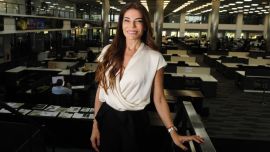Horacio Rodríguez Larreta vowed Friday to do “everything possible” to ensure children in the nation’s capital are in schools next week.
Speaking after an emergency meeting with President Alberto Fernández at the Olivos presidential residence, the Buenos Aires City mayor confirmed that he would continue its battle to keep schools in the courts.
On Thursday, City Hall filed a brief before the nation’s highest court asking for a protection measure to continue in-person school attendance in the country’s capital.
"I am going to do everything possible so that the kids are back in class on Monday. We presented an appeal of unconstitutionality. We hope that the [Supreme] Court will deal with it as soon as possible. Many parents have also made legal presentations," said the opposition leader, adding that the situation was due to "the national government not complying with the promised vaccines."
The mayor recognised, however, that should the lawsuit not prosper, he could not guarantee schoolchildren returning to their classrooms next month.
He said that depended on the presidential pledge that closures would not run beyond 15 days.
Vicente López Mayor Jorge Macri also announced Friday that he would follow a similar approach, filing an injunction to protect in-person classes with the Buenos Aires Province justice system. The opposition Juntos por el Cambio coalition has said it will also file a suit, while the Times understands some individual educational institutions plan to do the same. At least one school in La Plata has said it will open on Monday to students regardless.
Division
After initially enjoying big popularity and an unusual sense of political unity at the start of the pandemic, mobility restrictions and lockdowns have become an increasingly divisive issue between the national government and the opposition.
The latest round of measures, which include limits to circulation starting at 8pm, a ban on social gatherings and activities in closed spaces, were met with fierce criticism from the opposition, six months before key midterm elections.
The most divisive of the policies was the move to end physical attendance at classrooms in the AMBA region. Argentina banned in-person classes through all of 2020 as part of one of the world’s tightest lockdowns, and amid pressure from teacher unions with ties to the ruling Frente de Todos coalition alliance. Schools reopened almost two months ago in the capital.
Rodríguez Larreta said that he took with him to Olivos presidential residence the data on the transmission of coronavirus in City schools, remarking that "there was less than one percent of contagion, 0.89 percent to be precise." The president agreed with him on that point, according to the mayor, but insisted that going to school was a source of contagion, citing the number of those travelling.
In that regard, the mayor said: "The number of people using public transport to go to school is practically the same as before classes resumed – a third before as against a quarter today."
"To the degree that the pandemic gets worse, the last thing we should do would be to close down the schools," he added.
Rodríguez Larreta maintained that the presidential message following their meeting gave "inexact data," affirming that "this pandemic must be managed with evidence and data."
"They said that there was going to be 20 million doses of vaccines in December and today we have only seven million in the country while in our City the doses will be running out tomorrow without being able to continue vaccinating risk groups. If they had complied, the situation today would be very different," fired off Rodríguez Larreta.
Fernández defended his decision yesterday and said he would not accept a “rebellion” by regional governments against his order.
"None of us would like to stop face-to-face education, but we cannot not do it in the conditions we are in. We cannot. I have studied how the movement is generated and it is frankly alarming: students, teachers, non-teachers, transporters, fathers and mothers," he stated.
Disagree
Speaking Thursday, Rodríguez Larreta said that he “totally disagreed” with the decision to close schools for two weeks. Arguing that some children were at risk of being left behind by a lack of learning, he said the social impact of such measures were enormous.
“More than 70 percent of children are beginning to manifest symptoms of loneliness, anxiety and depression, as shown by various studies carried out by UNICEF, the INECO Foundation and the organisations of the City,” said Rodríguez Larreta.
Adding to the controversy and sense of injustice, Rodríguez Larreta underlined that he had not been consulted prior to the introduction of new restrictions.
“Yesterday the national government decided to break with the mechanism of dialogue and consensus that we have sustained for more than a year,” said the Juntos por el Cambio leader. “I want to be very clear: we were not consulted about any of the measures that were taken.”
Describing the decision to close schools unilaterally as “inexplicable,” the City mayor said he was baffled as to why Fernández had taken the decision given that they have held regular meetings over the handling of the coronavirus pandemic.
“A pandemic like this does not admit the possibility that a president does not coordinate their actions with the head of a government or governor,” he declared.
“We believe in dialogue, good faith, cooperation and joint planning. They can always count on me and my team for this,” he said, adding the lines of communication with City Hall would remain open nevertheless.
Rodríguez Larreta said he had agreed with the national government just six days ago what measures to take, but that the president had ripped up that guide within a week.
“At this point in the pandemic, we all know that the measures must be evaluated for at least 10 days, which is the period of evolution of the contagion,” he said. “Not even a week has passed and they want to throw away the plans that we put together.”
“We cannot mortgage the future of our children,” he added.
Denial
Consulted about the statements of Buenos Aires Province Governor Axel Kicillof, regarding Covid-19 patients being transferred from City to Province hospitals, the City Mayor assured that "historically it is the reverse."
"I do not doubt that City people were attended in the Province but the trend is the opposite. Around 30 percent of City [intensive] therapy beds have always been occupied by people coming from the Province, that’s a historic fact," affirmed Rodríguez Larreta, adding: "We are proud of being able to attend so many Argentines who need it and we’ll continue doing so."
Nevertheless, the mayor sidestepped the criticisms of Kicillof and Fernández that he was allowing himself to be influenced by ex-president Mauricio Macri, saying: "From the beginning of the pandemic I have maintained that I was not going to enter into political discussions where public health is at stake."
– TIMES with agencies


























Comments